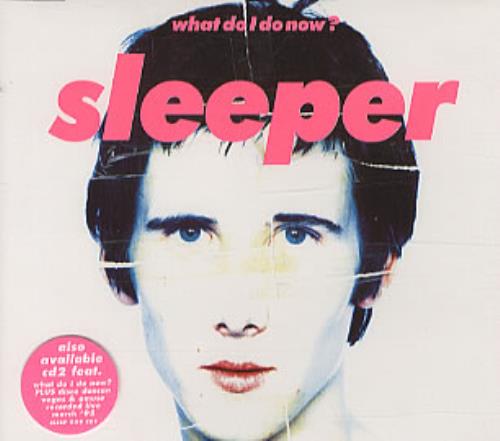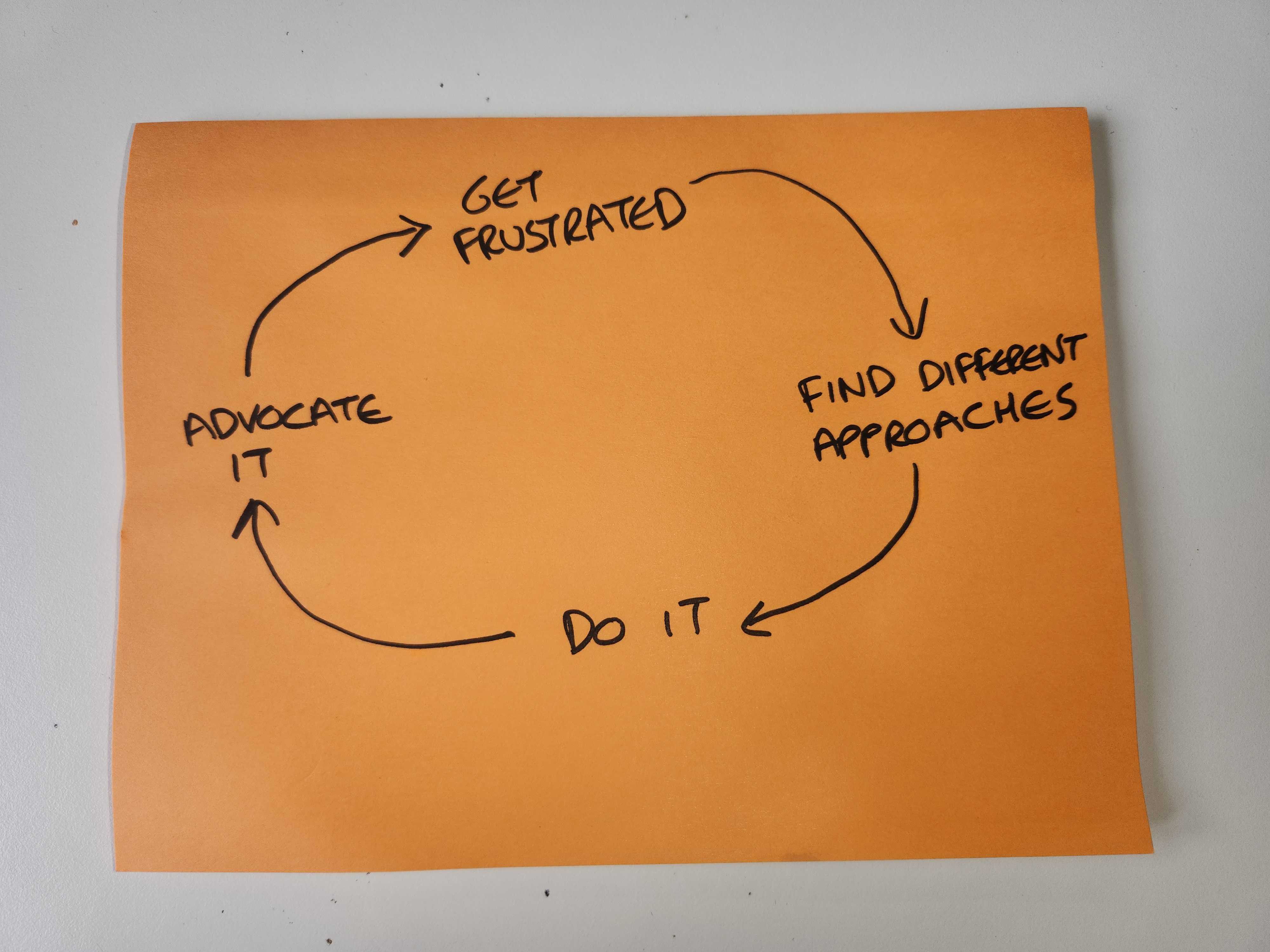
I’ve never been much of a one for career planning, from reading the ‘5 minutes with’ series from Jon Rhodes that seems to be a common trait of delivery people, lots of us kind of fall into it and enjoy it, that’s certainly been my situation.
The Amesy method of career development:

For the last few years I have been contracting, this has been a great experience seeing how different organisations work, learning about lots of new problem domains, and hopefully making things just a bit better; I’ve kind of just taken the contracts that were available at the time and haven’t been overly deliberate when selecting work, I find myself getting frustrated by common patterns and want to address them.
March is traditionally the time when plans start to emerge for the year ahead and so a bit of time for more deliberate career reflection and direction setting feels important.
I’m acutely aware that actually my lot in life isn’t too bad at the moment. I’ve been lucky, the downturn in the tech industry so far hasn’t affected me and I know people I really rate who are struggling to get employed or are being made redundant, in the current tech climate I hope this post doesn’t come across as tone deaf.
Where to start?
A few years back I came across ikigai, a frame for thinking about what you want from life, a kind of 4d-chess venn diagram:

The idea is that if you can find a space where all four of these needs are met you will be fulfilled. I’m not sure whether I totally buy into this, but nevertheless its a useful framing to consider where I am and where to go.
What do I love?
I’ve struggled with this framing in the past. Things I love in my personal life aren’t always the same things I love at work and thats ok, they’re different contexts. Yes its important to be able to be ‘your whole self’ at work but I’m pretty sure no one is going to pay me to spend 8 hours a day riding my bike.
I’ve translated this to mean what are my strengths. Previously I’ve found that the Clifton strengths finder has been helpful and I recognised me (or my biases perhaps?) in the results.
My strengths are:
Developer.
“People exceptionally talented in the Developer theme recognise and cultivate the potential in others. They spot the signs of each small improvement and derive satisfaction from evidence of progress.”
Ideation.
“People exceptionally talented in the Ideation theme are fascinated by ideas. They are able to find connections between seemingly disparate phenomena.”
Restorative
“People exceptionally talented in the Restorative theme are adept at dealing with problems. They are good at figuring out what is wrong and resolving it.”
Positivity
“People exceptionally talented in the Positivity theme have contagious enthusiasm. They are upbeat and can get others excited about what they are going to do.”
What am I good at?
I’ve decided to mangle a team building exercise from Emily Webber called the capability comb. The intent is to do this as an exercise as part of a team to work out how to work together and find ways to support each others development. I think the framing can be useful for considering my strengths and areas to develop though:
My superpowers are:
Communication, I’m great at spotting when a message isn’t landing or there isn’t a shared understanding and I work hard to plug those gaps. I’m a firm believer that broadcasting isn’t the same as receiving and it takes continuous repeated effort and clarity of message to get to a shared understanding.
Lightweight processes. I don’t ascribe to any particular framework or way of doing things, I cherry pick the right ways of working for the context in front of a team. What works well in discovery may not work in beta. What works well in one problem domain, doesn’t mean it will be a success in another. Inspecting and adapting is key.
Bias for action. On the whole its better to try something than to not. Not doing something is still a decision and still has consequences.
Facilitation. I’m good at balancing allowing all parties to be heard, and progressing something to a conclusion.
Making work enjoyable. I like to encourage teams to enjoy working with one another, not in a David Brent cringe-way, but by removing the nonsense that stops teams from collaborating and working well together.
I am good at (I can do on my own)
It’s worth saying that although I can do these things on my own, my preference is to collaborate and get a shared view
Strategy. Defining the problem to be solved, thinking about how we might solve it and how we will know when we are done. If a strategy doesn’t include delivery, its not a strategy.
Roadmapping and Prioritising. Choosing which things to work on next and justifying those choices, talking about confidence and delivery estimates. Establishing a culture that takes into account different viewpoints and perspectives from the team.
Managing stakeholders. Ugh I hate that term, everyone is a person with unique hopes and fears, understanding people motivations and desires for something and taking them with us is my strength. Teams are there as much to help understand a problem as to deliver it, working from this basis is key to success and buy in.
I can do this if I have support:
Service design. Thinking about the whole end to end service and creating a coherent service offering based on user needs is a strength, but I dont have formal service design training. Ideally I prefer to work with designers, or validate my approach if they are not in the team for whatever reason.
User research. Ive done research but I’m not a researcher, I worry about introducing my own biases and so need to check my approach with professional researchers if they’re not already in the team.
Measuring things. I’m ok at establishing metrics, working out how to measure them is more tricky and I need to lean on performance analysts or developers to help.
I’m new to this and want to improve (I can help with)
Economics. Nearly all business cases in the public sector come down to costs savings, making the economic case for change is the best way to escape that trap but its not something I’m overly familiar with, I would like to learn more about economics and measuring the financial benefits of things that traditionally fall in the ‘intangible benefits’ bucket.
Managing large programmes. I’ve not done this, I’ve been involved in enough large programmes that have been managed poorly to know what I would do differently (#Dunning-Kruger), especially in respect of governance and dependency management.
What can I be paid for?
Traditionally this has been delivery management but I’ve definitely reached the point where the intersection of delivery/product/design gets blurry. Most of the work I’ve done over the past few years has been in the discovery/alpha space where small teams tend to fulfil multiple roles. I enjoy working this way, expanding my skills beyond just delivery management. How I market product and design skills when my CV says delivery I’m less sure of.
I think there’s a sub question, what would I like to be paid for?
According to the Amesy method of career development, my current frustrations have been the way that digital teams have been governed. I would love to be able to influence and change how governance is done. Taking an approach that supports and enables teams, governance as a service, not a blocker. The sort of approaches advocated in the early stages of digital government but rarely got implemented at programme or departmental level. I’m tired of doing my best to build effective digital teams, only to be hamstrung by poor governance when we need support.
What the world needs?
Now theres a question! Within the context of this post, what’s clear is leadership in digital delivery in government isn’t improving enough, far too many initiatives still fail. The NAO recently published the Digital transformation in government: a guide for senior leaders and audit and risk committees so there is clearly a desire for change.
Do I think I have the skills to do this, yes absolutely, can I demonstrate that with my current CV? Not easily. So how do I progress? Most senior programme roles require showing experience of having done similar roles, I find this frustrating, current methods of governance aren’t working, but we’ll only recruit people with experience of working in those same ineffectual ways is how it feels. Where are the opportunities for fresh thinking? How do you demonstrate that effectively? Do these types of roles even exist for contractors? Do I need to take a permanent role to scratch that itch?
In conclusion.
I think what I’m describing is a service owner role, an old-school programme manager, or a ‘transformation/change’ consultant. Let me know if you’ve made it to the bottom and have come to different conclusions. If you are a doing these roles I would love to have a chat about the realities and how you landed it, especially if you came from a delivery background. If you’ve read this and think thats just the kind of shaped person we need to help transform our governance, have a look at my CV or get in touch!